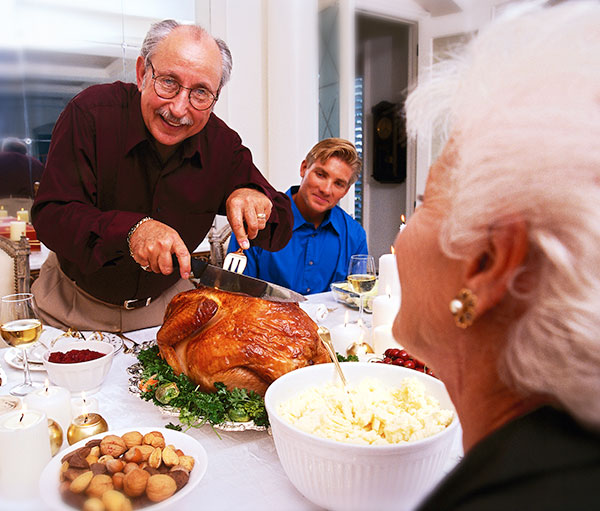Thanksgiving Week Is Also GERD Awareness Week

There’s a month, week or day for just about every health condition. When it comes to Gastroesophageal Reflux Disease Awareness Week, it makes sense to “celebrate” around Thanksgiving! That’s the week when many of us might experience heartburn—a burning sensation in the chest, behind the breastbone and in the middle of the abdomen.
At Thanksgiving and throughout the holiday season, how can we avoid a case of heartburn that can put a damper on the festivities? Dr. Juan Carlos Bucobo of Stony Brook University Hospital in New York offered six tips:
- Nibble, and slow down. Overeating and eating too fast will increase the chances of heartburn if you are predisposed. Smaller portions separated over time will decrease the chances of heartburn. At the main meal, try using a smaller plate and eating slowly.
- Identify the culprits. Certain foods are more likely to worsen heartburn. These include fatty foods, spicy foods, onions, garlic, caffeine, chocolate, citrus fruits and juices, and mints.
- Kick the habit. There’s no reason to wait for New Year’s to start your resolutions and stop smoking. Nicotine reduces the pressure of the muscle between the esophagus and stomach, increasing the likelihood of heartburn.
- Skip the eggnog. Alcohol, especially in large quantities and particularly red wine, has been implicated in worsening heartburn. If you are going to drink alcohol, do so in moderation.
- Avoid lying down after a meal. Overeating and alcohol are sure to make you want to snooze after a holiday meal. Resist the urge to lie down within three hours of eating, as it is likely to worsen your heartburn.
- Seek help. There are several categories of over-the-counter medications available to ease the burn. When symptoms become frequent, more than 2–3 times per week, visiting a doctor is important in establishing the diagnosis and prescribing the most effective treatment.
The International Foundation for Functional Gastrointestinal Disorders (IFFGD) sponsors GERD Awareness Week to call attention to symptoms that might mean we’re suffering from more than the usual, temporary heartburn. If symptoms persist and heartburn becomes chronic, or we experience regurgitation of acid, difficulty swallowing, a sore throat or hoarseness in the morning, those could be signs of gastroesophageal reflux disease (GERD).
The National Institutes of Healthealt reports that GERD may be caused by:
- A hiatal hernia—a condition in which the opening in the diaphragm lets the upper part of the stomach move into the chest
- Pressure on the abdomen from obesity
- Certain medications, including those used to treat asthma, high blood pressure, allergies or depression
- Smoking
Statistics also suggest that age-related changes in the digestive tract raise the risk as we grow older.
If left untreated, GERD can cause chronic inflammation of the esophagus, swallowing problems, lung problem and erosion of the teeth. But here’s something to be thankful for: GERD can be treated. Lifestyle changes, medications and sometimes surgery all can improve the condition. The IFFGD offers a consumer brochure with lots more information.
Source: IlluminAge with information from the International Foundation for Functional Gastrointestinal Disorders and Stony Brook Medicine.
The information in this article is not meant to replace the advice of your healthcare provider. Report symptoms of heartburn and reflux to your doctor.


